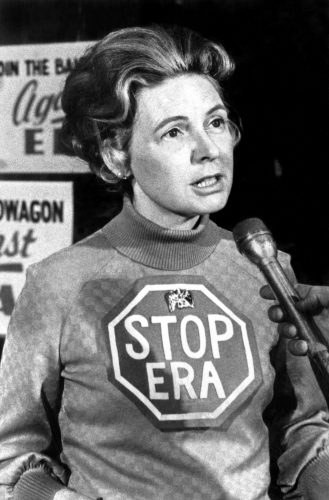Published in 1963, Betty Friedan’s “The Feminine Mystique” is commonly attributed as sparking the feminist movement of the 1960s and ’70s. She put a spotlight on the feeling of emptiness many housewives of the era felt, confined to the home with little social interaction outside their immediate family.

“Each suburban wife struggled with it alone,” Friedan wrote. “As she made the beds, shopped for groceries, matched slipcover material, ate peanut butter sandwiches with her children, chauffeured Cub Scouts and Brownies, lay beside her husband at night — she was afraid to ask even of herself the silent question — “Is this all?
Conservative activist and constitutional lawyer Phyllis Schlafly was not concerned about this alleged emptiness housewives faced. On the contrary, Schlafly was a vocal and influential opponent of the 1960s and ’70s second wave-feminist movement. She first came into the national spotlight with her self-published book “A Choice, Not an Echo.”
In the book, Schlafly denounced the Republican establishment she considered unwelcoming of the party’s conservative wing.
“A Choice, Not an Echo” sold more than three million copies and is credited with helping Sen. Barry Goldwater secure the Republican nomination for president in the 1964 election. Although Goldwater eventually lost to President Lyndon B. Johnson, “A Choice, Not an Echo” marked the beginning of Schlafly’s career as an influential voice of the right.
Schlafly passed away on Sept. 5, but her legacy lives on. She played a major role in the successful campaign against the Equal Rights Amendment (ERA), which would have prohibited gender discrimination. Schlafly founded the Stop ERA campaign, and the Eagle Forum in 1972, after the proposed amendment passed both the U.S. Senate and House of Representatives.
According to EqualRightsAmendment.org, members of Stop ERA campaigned under the grounds that if ERA would “deny (a) woman’s right to be supported by her husband, privacy rights would be overturned, women would be sent into combat and abortion rights and homosexual marriages would be upheld.”
The Eagle Forum still exists today, advocating traditional family values.
Before Schlafly’s Stop ERA campaign, ERA was considered more than likely to be ratified by the minimum 38 of 50 states required to be adopted into the constitution. Her campaign arguing women, especially housewives, would lose their status and security in American society if ERA were passed, quickly changed that.
“Since women are the ones who bear the babies and there’s nothing we can do about that, our laws and customs then make it the financial obligation of the husband to provide the support,” Schlafly said in 1973. “It is his obligation and his sole obligation. And this is exactly and precisely what we will lose if the Equal Rights Amendment is passed.”
When the deadline for ERA’s passing came in 1982, Schlafly’s campaign proved successful. According to the Washington Post, 15 states rejected ERA and five revoked their previous ratifications. Only 35 states ratified ERA, three less than the required 38 states.
Schlafly remained a vocal conservative following the Stop ERA victory until her passing at age 92. She opposed citizenship for immigrants who did not speak English, denounced women being drafted into the military, argued climate change was not the result of human activity and opposed the “transgender agenda.” Schlafly was also a supporter of presidential nominee Donald Trump, who spoke at her funeral.
Ironically, Schlafly represents the type of woman second-wave feminists admired. She was independent, well spoken, educated and spent a significant amount of time away from home doing speaking tours for the Stop ERA campaign. There are even rumors Schlafly wanted a post in the Reagan administration, but was not considered because she was a woman.
The conservative movement Schlafly in large part spearheaded is not just a crusade of the past. It affects feminists in 2016. Although women under the age of 40 may not know her name like they would famous feminists of the 1960s and ’70s like Betty Friedan or Gloria Steinem, the battle between feminists and anti-feminists continues just the same.
“I think the word ‘feminism’ has unfortunately become synonymous with aggression, man-hating or even an unwillingness to engage in conversation,” DePaul senior Elle Engelhard said. “Thus, people are hesitant to use the word. We as a society need to alter perceptions and connotations surrounding the term ‘feminism.’ Feminism should symbolize inclusiveness, which is what I view the goal of equal rights for women to ultimately be.”
Despite the stigma surrounding feminism, DePaul senior Megan Wynbeek remains hopeful.
“Honestly, I think it’s kind of sad that we need to be told to treat women and men equally, but clearly some people still don’t understand the concept. We are definitely taking steps towards equality, specifically with events, such as the removal of the tampon tax, but there are still many more steps that need to be taken.
More than 30 years after Schlafly’s successful campaign against the ERA, young feminists, like Wynbeek and Engelhard, still view a constitutional amendment explicitly stating women cannot be denied civil rights based on their sex.
“I think any U.S. legislation passed with the goal of enforcing equality — specifically financial equality for women — would be beneficial in an equal rights movement,” Engelhard said. “Legislation has the power to reflect the ideals of the society in which it’s passed and also to alter the conversation surrounding the issues.”
The 2016 presidential election pits Democratic nominee Hillary Clinton, a vocal feminist and de facto member of the political establishment against Trump, a political outside with Schlafly’s stamp of approval. Perhaps the best and only way we can determine the strength of Schlafly’s legacy is by waiting to see who is elected into office this November.
Following Schlafly’s passing, prominent conservative politicians and commentators voiced their condolences




